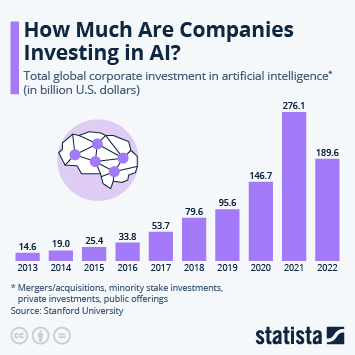Boom phases in the development of artificial intelligence, such as the victory of the chess computer Deep Blue over at the time world chess champion Garry Kasparov in 1996 and 1997, have been around for decades. However, none have piqued the interest of investors and big tech companies as much as the current one. This wave of AI investment began with the release of OpenAI's ChatGPT, a direct-to-consumer application based on the GPT language model.
Critics see this type of artificial intelligence as little more than "stochastic parrots" that put together words and sentences according to statistical probabilities. AI evangelists, on the other hand, champion ChatGPT as the first big step towards a true "Artificial General Intelligence" that could exhibit the same cognitive abilities as a human. Companies and investors aren't afraid to spend big to accelerate this development.
As an analysis of the 100 most promising AI start-ups by tech market research company CB Insights shows, OpenAI raised around $14 billion in capital through partnerships with Microsoft and other investments, and its potential market capitalization is currently estimated at around $80 billion. Anthropic, the company behind ChatGPT competitor Claude, is in second place with around $4.2 billion, while the big data analysis platform Databricks ranks third with approximately $4 billion. In terms of current valuation, the U.S. company comes in second with $43 billion, a figure that none of the other entrants in the top 8 can match.
Another striking fact: Seven of the eight best-funded companies in the top 100, selected by CB Insights based on "deal activity, industry partnerships, team strength, investor strength, patent activity, and proprietary Mosaic Scores", are based in the USA. The sole outlier, Mistral AI, a French company founded just a year ago by former Meta and Google DeepMind employees, has already raised $544 million in capital in less than twelve months. Looking at the complete line-up, a total of 69 of the top 100 AI startups are based in the USA, followed by the United Kingdom (7), Canada (5), Germany and France (3 each) and China (2).
Although the market does not yet seem to believe that the AI boom will fizzle out any time soon, some of the most vocal critics predict a crash in the near to medium term. Even the companies investing in AI are now skeptical. According to a report by tech publication The Information, decision-makers in companies such as Amazon and Google urged their marketing departments to promote AI less aggressively to their corporate customers, as the ubiquitous hype would mask the high operating costs and the results would be less revolutionary than hoped.






















